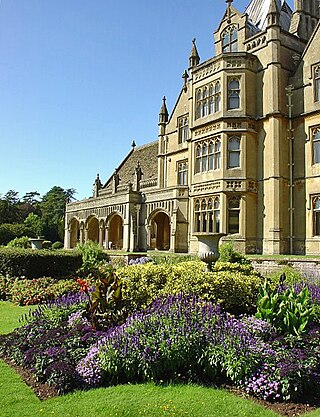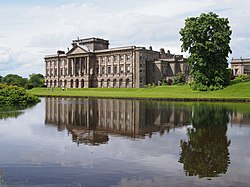
Earl of Macclesfield is a title that has been created twice. The first creation came in the Peerage of England in 1679 in favour of the soldier and politician Charles Gerard, 1st Baron Gerard. He had already been created Baron Gerard, of Brandon in the County of Suffolk, in 1645, and was made Viscount Brandon, of Brandon in the County of Suffolk, at the same time as he was given the earldom. These titles are also in the Peerage of England. Lord Macclesfield was the great-grandson of the distinguished judge Sir Gilbert Gerard, Master of the Rolls from 1581 to 1594. He was succeeded by his eldest son, the second Earl. He was involved in the Rye House Plot of 1683, was sentenced to death but later pardoned by the King. On his death without legitimate issue in 1701 the titles passed to his younger brother, the third Earl. He had earlier represented Yarmouth, Lancaster and Lancashire in the House of Commons. When he died in 1702 the titles became extinct.

Baron Bagot, of Bagot's Bromley in the County of Stafford, is a title in the Peerage of Great Britain. It was created on 12 October 1780 for Sir William Bagot, 6th Baronet.

Baron Faringdon, of Buscot Park in the County of Berkshire, is a title in the Peerage of the United Kingdom. It was created in 1916 for Sir Alexander Henderson, 1st Baronet, who had previously represented Stafford West and St George's, Hanover Square in the House of Commons as a Liberal Unionist. He had already been created a baronet in 1902. He was succeeded by his grandson, the second Baron. He was the son of the Hon. Harold Henderson, eldest son of the first Baron, who predeceased his father. Lord Faringdon was a member of the London County Council. As of 2017 the titles are held by his nephew, the third Baron, who succeeded in 1977. He is the son of the Hon. Michael Thomas Handerson, second son of the Hon. Harold Henderson.
Baron Hamilton of Dalzell, in the County of Lanark, is a title in the Peerage of the United Kingdom. It was created in 1886 for the Liberal politician John Hamilton. He had previously represented Falkirk and Lanarkshire South in the House of Commons and after his elevation to the peerage served under William Ewart Gladstone as a Government Whip from 1892 to 1894. His eldest son, the second Baron, was a Government Whip from 1905 to 1911 in the Liberal administrations of Henry Campbell-Bannerman and H. H. Asquith and also served as Lord Lieutenant of Lanarkshire. His nephew, the third Baron, was Lord Lieutenant of Surrey. As of 2010 the title is held by the latter's grandson, the fifth Baron, who succeeded his father in 2006.
Baron Deramore, of Belvoir in the County of Down, was a title in the Peerage of the United Kingdom. It was created on 18 November 1885 for the Conservative Member of Parliament Sir Thomas Bateson, 2nd Baronet. His father Robert Bateson had been created a baronet, of Belvoir Park in the County of Down, on 18 December 1818 in the Baronetage of the United Kingdom. The barony was created with special remainder to the first Baron's younger brother George, who succeeded him as second Baron.
Baron de Ramsey, of Ramsey Abbey in the County of Huntingdon, is a title in the Peerage of the United Kingdom. It was created in 1887 for Edward Fellowes, who had previously represented Huntingdonshire in the House of Commons as a Conservative for 43 years. His eldest son, the second Baron, sat as Member of Parliament for Huntingdonshire and Ramsey and later served as a Lord-in-waiting from 1890 to 1892 in the Conservative administration of Lord Salisbury. His grandson, the third Baron, was Lord Lieutenant of Huntingdonshire from 1947 to 1965 and of Huntingdon and Peterborough between 1965 and 1968. As of 2017 the title is held by the latter's son, the fourth Baron, who succeeded in 1993.

Baron Daresbury, of Walton in the County of Chester, is a title in the Peerage of the United Kingdom. It was created on 21 June 1927 for Sir Gilbert Greenall, 2nd Baronet by King George V. The Baronetcy, of Walton Hall in the County of Chester, was created in the Baronetage of the United Kingdom on 22 February 1876 for his father Gilbert Greenall, who was head of the family brewing business and also represented Warrington in the House of Commons as a Conservative. As of 2015 the titles are held by the first Baron's great-grandson, the fourth Baron, who succeeded his father in 1996. The former seat of the Greenall family was Walton Hall near Warrington, Cheshire. However, the house was sold in 1941. The fourth Lord Daresbury was based at Hall Lane Farm on the Daresbury estate, home of the Creamfields music festival.

Baron Ashcombe, of Dorking in the County of Surrey and of Bodiam Castle in the County of Sussex, is a title in the Peerage of the United Kingdom. It was created in 1892 for the Conservative politician George Cubitt of Denbies House, Dorking, Surrey, who was continuously elected at elections over a 32-year period. He was the son of the architect Thomas Cubitt. Lord Ashcombe was succeeded by his son, the second Baron. He was a Conservative Member of Parliament and also served as Lord Lieutenant of Surrey. As of 2013, the title is held by his kinsman, the fifth Baron, who succeeded his first cousin, once removed in 2013.

Baron Amherst of Hackney, in the County of London, is a title in the Peerage of the United Kingdom. It was created on 26 August 1892 for the former Conservative Member of Parliament William Tyssen-Amherst, with remainder, in default of male issue, to his eldest daughter Mary and her issue male. Tyssen-Amherst had previously represented West Norfolk and South West Norfolk in the House of Commons. He was succeeded according to the special remainder by his daughter Mary. She was the wife of Colonel Lord William Cecil, third son of William Cecil, 3rd Marquess of Exeter. As of 2017 the title is held by their great-great-grandson, the fifth Baron, who succeeded his father in 2009. As a male-line descendant of the third Marquess of Exeter he is also in remainder to this peerage and its subsidiary titles the earldom of Exeter and barony of Burghley.

Baron Leigh has been created twice as a hereditary title, once in the Peerage of England and once in the Peerage of the United Kingdom. The writer Jane Austen is associated with this dynasty.

Baron Wraxall, of Clyst St George in the County of Devon, is a title in the Peerage of the United Kingdom. It was created in 1928 for the Conservative politician George Gibbs. As of 2017, the title is held by his grandson, the fourth Baron, who succeeded his father, a former diplomat, in that year. The Barons Wraxall are related to the Barons Aldenham and Barons Hunsdon of Hunsdon. The first Baron's grandfather William Gibbs was the younger brother of George Henry Gibbs, the father of Hucks Gibbs, 1st Baron Aldenham, whose fourth son was Herbert Gibbs, 1st Baron Hunsdon of Hunsdon. The wife of the brother of the first Baron Wraxhall was Lady Helena Cambridge, a niece of Queen Mary and descendant of King George III.
Baron Brocket, of Brocket Hall in the County of Hertford, is a title in the Peerage of the United Kingdom. It was created on 19 January 1933 for the businessman Sir Charles Nall-Cain, 1st Baronet. He was chairman of the brewing firm of Robert Cain & Sons, which had been founded by his father Robert Cain. Before his elevation to the peerage, Nall-Cain had been created a baronet, of the Node, in 1921. His son, the second Baron, represented Wavertree in the House of Commons as a Conservative. As of 2017 the titles are held by the latter's grandson, the third Baron, who succeeded in 1967.
Baron Crawshaw, of Crawshaw in the County Palatine of Lancaster and of Whatton in the County of Leicester is a title in the Peerage of the United Kingdom. It was created on 25 August 1892 for Sir Thomas Brooks, 1st Baronet. He notably served as High Sheriff of Lancashire in 1884. Brooks had already been created a baronet in the Baronetage of the United Kingdom, of Crawshaw Hall and Whatton House, on 9 February 1891. As of 2013 the titles are held by his great-grandson, the fifth Baron, who succeeded his elder brother in 1997.
Baron Crathorne, of Crathorne in the North Riding of the County of York, is a title in the Peerage of the United Kingdom. It was created on 15 July 1959 for the Conservative politician and former Minister of Agriculture and Fisheries, Sir Thomas Dugdale, 1st Baronet. He had already been created a baronet, of Crathorne in the North Riding of the County of York, in 1945. As of 2016 the titles are held by his son, the second Baron, who succeeded in 1977. Lord Crathorne is one of the ninety elected hereditary peers that remain in the House of Lords after the passing of the House of Lords Act 1999, and sits as a Conservative.
Baron Aldenham, of Aldenham in the county of Hertfordshire, is a title in the Peerage of the United Kingdom that was created on 31 January 1896 for the businessman Hucks Gibbs. He was head of the family firm of Antony Gibbs & Sons and a director and Governor of the Bank of England. Gibbs also briefly sat as a Conservative Member of Parliament for the City of London. His fourth son Herbert Cokayne Gibbs was created Baron Hunsdon of Hunsdon in 1923.

Thomas Wodehouse Legh, 2nd Baron Newton PC, DL was a British diplomat and Conservative politician who served as Paymaster General during the First World War.

William John Legh, 1st Baron Newton,, was a British Conservative politician and Volunteer officer.

The Leghs of Lyme were a gentry family seated at Lyme Park in Cheshire, England, from 1398 until 1946, when the stately home and its surrounding parkland were donated by the 3rd Lord Newton to The National Trust.
Baron Dunleath, of Ballywalter in the County of Down, is a title in the Peerage of the United Kingdom. It was created on 29 August 1892 for the businessman and former Conservative Member of Parliament for Downpatrick, John Mulholland. The Mulholland family were involved in the cotton and linen industry in Ulster in the north of Ireland. The first Baron's son, the second Baron, represented Londonderry North in the House of Commons as a Conservative. His grandson, the fourth Baron, was a member of the Northern Ireland Assembly for the Alliance Party. He was succeeded by his first cousin, the fifth Baron, who had already succeeded his father as second Baronet of Ballyscullion. As of 2017 the titles are held by the fifth Baron's son, the sixth Baron, who succeeded in 1997.
Richard William Davenport Legh, 3rd Baron NewtonDL, JP was a Baron in the Parliament of the United Kingdom.












